The use of analytics is good for business. Researchers from MIT Sloan Management Review and IBM found that organizations that used business information and analytics outperformed organizations that did not. Businesses of all types are adopting the use of analytics to get use out of the vast amount of data that is being generated in our overly-quantified world. Even sports franchises are getting into the game of analytics.
Analytics Adoption in Sports
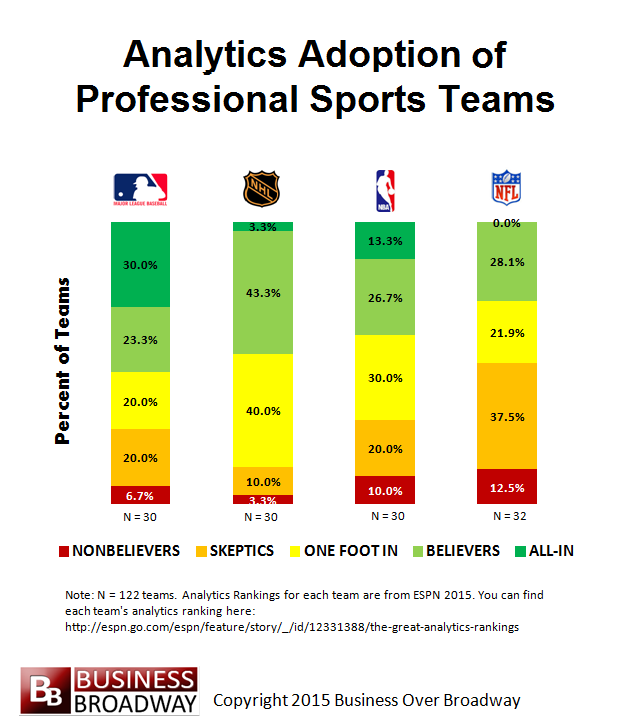
Figure 1. Analytics Adoption of Professional Sports Teams. Baseball has a highest analytics adoption rate while football has the lowest.
ESPN recently ranked 122 sports teams on their use of analytics in running their franchise (see Great Analytics Ranking). ESPN experts and researchers evaluated each team franchise from the NFL, NBA, NHL and MLB using the following criteria:
- strength of analytics staff
- buy-in from executives and coaches
- investment in bio-metric data
- extent to which overall approach is predicated on analytics
Based on these evaluations, teams were ranked on their analytics prowess along five categories, from analytics laggards to analytics leaders, using the respective labels: NON-BELIEVERS; SKEPTICS; ONE FOOT IN; BELIEVERS; ALL-IN. Teams that were ranked as analytics leaders (i.e., ALL-IN) were described in the article as playing the long game, leveraging machine learning, having a mandate to answer any analytical question, requiring technical and non-technical staff members to be up to speed on the metrics the team uses, investing in high-performance computing (HPC) systems and having a coherent, holistic approach toward analytics. At the other end of the continuum, analytics laggards (i.e., NON-BELIEVERS) do not invest in or have just started their foray into data and analytics. The other analytics categories reflected various levels of analytics adoption.
Professional sports leagues show different analytic adoption rates (χ²=26.8, p < .01). As you can see in Figure 1, teams in the MLB tend to be more analytically savvy than teams in other sports leagues. Thirty percent of MLB teams are considered “ALL-IN” when it comes to analytics while teams in the NFL show the lowest adoption and use of analytics, with no teams considered “ALL-IN.”
The Effectiveness of Analytics in Sports
While it’s interesting to show that teams differ with respect to their analytics prowess, it’s valuable to understand if the adoption of analytics leads to better outcomes. Last month, Charles Barkley, responding to a critic about his attitude regarding the use of analytics in sports, said the following:
I always believe analytics is crap…Smart guys had no talent to play. So, smart guys, trying to fit in, made up a term called ‘analytics.’ Analytics don’t work…. The NBA is about talent. People who talk about analytics have one thing in common, they’re a bunch of guys who ain’t never played the game and they never got the girls in high school and they just want to get in the game.
Charles Barkley
While Mr. Barkley may have nailed my high school experience, he’s wrong about the value of analytics in sports. While I do agree with him that sport is about talent, teams can use analytics to optimize this talent. For example, NFL defenses can analyze historical data about their opponents to determine what type of defensive lineup will optimize their outcome of success. Analytics puts defensive backs in the right area of the field to be able to make that key interception. No matter how talented a defensive back is, if he is in the wrong part of the field, he won’t be able to make that play. While that is just one example of the use of analytics, there are many other applications of analytics in sports both on and off the field, like improving offensive play calling, adjusting players’ diet and training, growing a fan base and more.
Analytics Adoption and Winning Percentages of Sports Teams
Does the adoption of analytics and an analytic culture help sports teams be more successful? While there are many ways to measure the success of a team, a good overall measure of team performance is winning percentage (WP: Percent of games a team wins). After all, at the franchise level, the ultimate goal is to win games.
For each team in the ESPN analytics ranking, I culled their winning percentage from the most recently completed season, 2014, from each league’s Web site (i.e., MLB.com, NBA.com, NHL.com and NFL.com). I merged each team’s winning percentage with their respective analytics ranking.
Analytics Laggards Win Less Often
For each league, I examined the relationship between teams’ analytics ranking and their winning percentage. While no statistically significant results were found using the traditional probability standard of p < .05, two of the leagues came close (MLB: p = .08; NFL: p = .09). In each of these leagues, teams who were NON-BELIEVERS had lower WPs (.46, .30) compared to the teams from the remaining analytic groups (.50, .52).
The lack of statistical significance could be due to the small sample sizes of some subgroups (e.g., NHL NON-BELIEVERS = 1; MLB NON-BELIEVERS = 2). To improve statistical power, I combined the data from all four leagues (See Figure 3) and compared the winning percentage of NON-BELIEVERS (i.e., analytics laggards) with other teams.
I found that teams that are NON-BELIEVERS have lower winning percentages (41%) than teams that are BELIEVERS and ALL-IN (WP = 52%; t(59) = 2.47, p < .05). Even teams with little or moderate adoption of analytics (i.e., SKEPTICS and ONE FOOT IN) outperform (WP = 49%) the analytics laggards (t(69) = 1.9, p = .06).
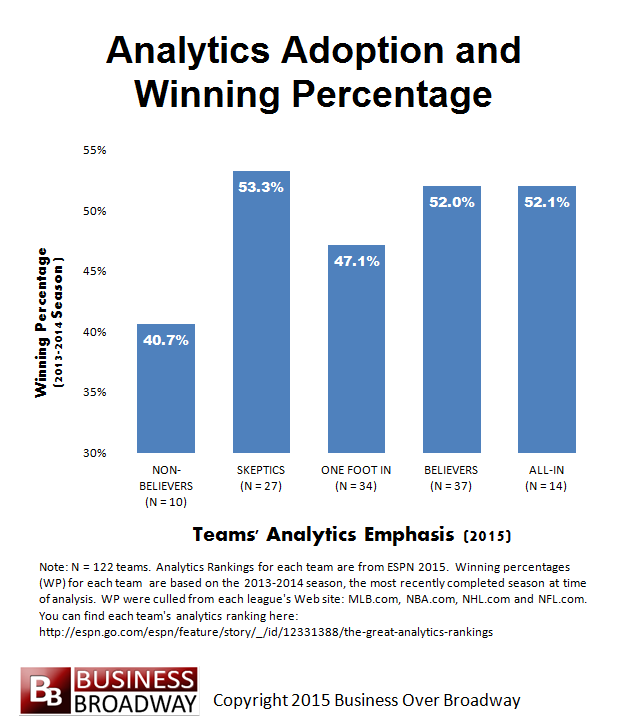
Figure 3. Analytics Adoption and Winning Percentage. NON-BELIEVERS win fewer games than other teams.
Summary
Professional sports teams differ with respect to their adoption of analytics into their operations and culture. Baseball franchises, compared to others, adopt analytics at a significantly higher rate than the other sports leagues studied.
More importantly, results of the study showed that teams that do not adopt analytics win fewer games in a given season than teams who adopt analytics.
The Game Isn’t Over
While this current study is compelling, further research is needed to confirm the findings and extend understanding of the value of analytics in sports. First, the data used in the current study is cross-sectional in nature. Longitudinal studies would provide better evidence that analytics leads to better performance. To better understand the impact of analytics on teams’ future performance, I will re-run these analyses using the results at the end of the 2015 season to see how well analytics rankings today correlate with performance a year later.
Second, we need to get more specific in our language about what we mean by analytics adoption. The quality of ESPN’s team rankings needs to be evaluated. Because ESPN didn’t share details about their ranking process (e.g., what was the process behind the rankings, was team feedback used, did they consider rater bias), we have to take their results at face value. ESPN’s ranking data are likely rich in useful information that would help both validate their ranking process and help improve how teams can adopt analytics successfully. For example, how well do each of the four analytic components predict team performance? In the world of business, researchers have shown that company culture around analytics is as important to business success as the technology behind it. I suspect the same it true for sports teams. Digging deeper into their ranking data, ESPN could help teams know how to best incorporate analytics into their culture.
Bet on Analytics
The current study findings support the notion that analytics do work to improve team performance. Sports teams that adopt analytics tend win more games than teams that do not. For the gamblers out there, to improve your odds of winning, before you place your bet, check if your team uses analytics. For the sports teams out there, whether or not you adopt analytics could mean the difference between a winning season and a losing season.

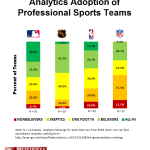

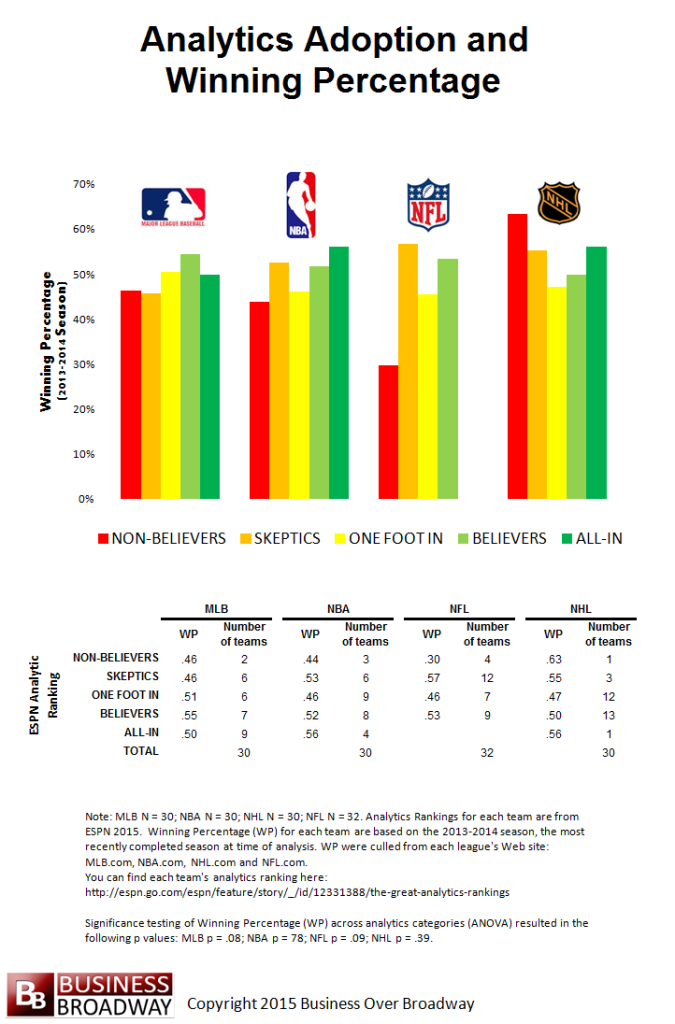
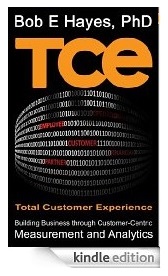
 Beyond the Ultimate Question
Beyond the Ultimate Question Measuring Customer Satisfaction and Loyalty (3rd Ed.)
Measuring Customer Satisfaction and Loyalty (3rd Ed.)
Comments are closed.